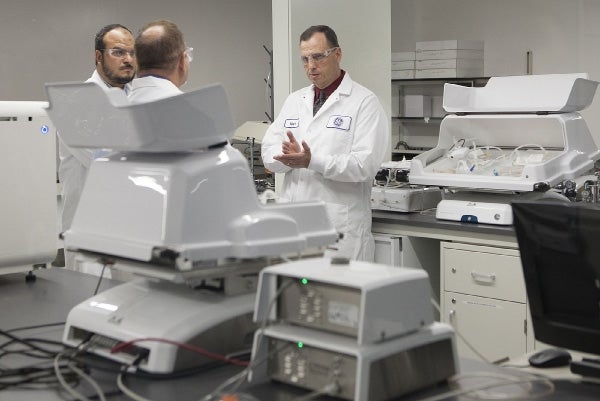At its new Marlborough headquarters, GE Healthcare Life Sciences is focusing on developing the tools that can help produce personalized drugs.
The now-local company, a provider of solutions for drug production as well as imaging agents, is using its worldwide presence and connections, biomanufacturing expertise and location in the heart of Massachusetts’ booming life sciences sector to help researchers, biotech and biopharma companies and clinicians make advances in molecular and precision medicine, or customized health solutions to some of the world’s deadliest diseases. “It’s one thing to talk about biomanufacturing and the acceleration of biomanufacturing, but it’s quite another thing to walk through your laboratories upstairs and walk through your space upstairs and see how you are disrupting the very notion of how a company or even a destination can think about participating in the bioprocessing arena,” said Travis McCready, president and CEO of the Massachusetts Life Sciences Center, at the facility’s grand opening on June 23.
GE plans to help push precision medicine forward worldwide through its biomanufacturing offerings and its diagnostic contrast media agents. This includes its FlexFactory manufacturing platforms – designed in Marlborough – which produce small batch, end-to-end biologic manufacturing solutions using single-use technologies that can be scalable for large populations.
The FlexFactory can either be set up in an existing facility or lab or inside of one of GE’s KUBio modular biologics factories, which are pre-fabricated and shipped, piece by piece, to any location. A FlexFactory or KUBio can be up and running within 11 months, according to GE. KUBios are meant to spur production of biosimilars – drugs that are similar to drugs made by different companies – in developing countries.
Massachusetts impact
The $27-million, 210,000-square-foot headquarters on Results Way in Marlborough has been operational since January, but GE held a grand opening event for it last month. At the event, GE Healthcare Life Sciences President and CEO Kieran Murphy said Life Sciences decided to make the leap to Massachusetts long before GE’s North American corporate headquarters settled on Boston.
Part of the reason the life sciences division moved here was to better leverage GE’s 2012 acquisition of Xcellerex, a Marlborough company that specializes in single-use bioreactors. The acquisition allowed GE to expand its line of single-use products and to develop the eventual FlexFactory model, according to the company. GE also has a manufacturing facility in Westborough that produces single-use products and consumables for biopharmaceutical manufacturing.
The Marlborough building has 40,000 square feet of lab space, supporting research and development for cell and immune therapies, early stage drug development, biomanufacturing and scientific and medical affairs support. A FlexFactory – GE’s ninth – will be in place by next fall.
So far, 250 local employees have been hired, with an additional 30 making the move to Massachusetts from New Jersey. The Marlborough facility will be at capacity with 500 employees, according to GE. By the end of this year, GE will have almost 5,000 employees in the Bay State, including those at the corporate office in Boston.
The impact of GE’s move on the life sciences sector in Massachusetts will be huge, said Robert K. Coughlin, president and CEO of the trade group Massachusetts Biotechnology Council.
“They’re a partner to the life sciences companies that we have here. It makes perfect sense for them to be here so that they can grow their business, but it’s also equally as beneficial for biopharma companies here to have GE as a partner,” Coughlin said.
Phil Vanek, the general manager of cell therapy technologies at GE Healthcare, said the move benefitted GE as well from an intellectual resources standpoint.
“You have an educational environment up there that is second to none. The density and caliber of talent available to us is top notch,” Vanek said.
Precision medicine
Precision medicine has received a lot of attention over the past year. President Barack Obama put a national spotlight on it when he announced a federal research initiative for it in his 2015 State of the Union address. Cures for some of the world’s most dangerous diseases are widely considered to exist under the precision umbrella.
The next wave of precision medicine is cell therapy, according to GE. Unlike biologics, which produce batches for thousands of patients, cell therapy is even more personalized – one batch treats a single patient. Such therapies are not yet widely available but have shown success in early clinical trials.
Cell therapies are a small part of the $4-billion GE Healthcare Life Sciences, but that is expected to grow tenfold over the next 10 years, Vanek said. That will be done through strategic acquisitions and partnerships with companies that can help contribute to the workflow, he said, as well as in-house research and development and other investments, and by partnering with pharmaceutical and biotechnology companies and clinical researchers.
“We have to invent new technologies. We have to rethink what a customer’s workflow would look like today, but more importantly what a customer’s workflow would be like that in the future,” Vanek said.
There is a lot of crossover between the technologies used for biologics and cell therapies, which will allow for a more seamless transition.
“From a technology perspective, there’s a lot of similarities,” Vanek said. “Therefore, we can process heavily from where GE has been over the years.”
Cell therapy could also eventually make its way into FlexFactory concept and KUBio bioprocessing environments, he said. It would just be a matter of a request from the right customer.
After a tour of the facility, Gov. Charlie Baker said the repercussions of GE’s work in the cell therapy sphere could resonate far beyond Massachusetts.
“This whole notion of trying to figure out a process to unmask the tumors that can ultimately be used to help people’s own antibodies fight back against cancer is a really big idea, and would change in very significant ways the way we think about cancer,” Baker said.

